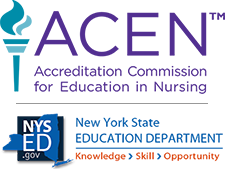Nurse Administrators improve the current and future patient needs while improving nursing retention and satisfaction.
The Bureau of Labor Statistics predicts a much faster-than-average projected job growth rate of 32% from 2019-2029. High annual salaries averaging $110,000 in hospitals and $92,000 in physicians offices.Learn how to Improve the current and future patient needs while improving nursing retention and satisfaction.

Accreditation Commission for Education in Nursing
All of Daemen's nursing programs are accredited by the Accreditation Commission for Education in Nursing (ACEN), formerly the National League for Nursing Accrediting Commission, Inc., 3390 Peachtree Road NE, Suite 1400, Atlanta, GA 30326, Phone: 404.975.5000, www.acenursing.org.
New York State Education Department
Registered with the New York State Board of Regents.
Program Benefits
- Earn your MS in Nursing Leadership and Healthcare Administration
- If you have a Masters in Nursing, earn your post masters certificate in Nursing Leadership and Healthcare Administration in just 24 credits
- Fully online program
- Practical experience with a current nursing healthcare leader
- Financial literacy including budgeting and value based care
- System-based leadership - leadership, quality care, quality improvement and outcomes
- Advocacy for decision-making that impacts nurses
- Scholarships available to defray costs
Daemen’s Nursing Leadership and Healthcare Administration program provides students with a local option to gain imperative skills to lead in today’s healthcare systems while working alongside a current nursing healthcare leader.
Graduates may choose to earn the ANCC Nurse Executive Certification (BC-NE).
Career Outlook
- Hospital clinical nurse leader/manager
- Hospital healthcare administrator (CNO)
- Director of patient care services
- School nurse leader/administrator
- Public health nurse leader
- Long term care nurse leader/administrator/DON
- Healthcare data analytics
- Quality review and utilization nurse leader
- Home care nurse leader/administrator
Program Specifics
- Possession of a baccalaureate degree in nursing from a ACEN or CCNE accredited program.
- One year medical-surgical clinical experience (or equivalent).
- Completion of an undergraduate or graduate statistics course with a grade of C or better.
- Cumulative grade point average of 3.25 or above (on a 4.0 scale) from all colleges/universities attended. Applicants with GPAs below 3.25 in undergraduate studies may be admitted on a provisional basis if they submit evidence of the potential to be successful in graduate studies.GPAs below 3.25 in undergraduate studies may be admitted on a provisional basis if they submit evidence of the potential to be successful in graduate studies.
- Current registered professional nursing license.
- Current resume.
- Letters of intent or letters of recommendation may be submitted to strengthen application.
- Interview with the nursing faculty.
Graduate Nursing Research Core Requirements: 12 Credits
- NUR501 Nursing Informatics and Healthcare Technologies (1)
- NUR512 Theoretical Basis of Advanced Nursing Practice (3)
- NUR602 Qualitative Research (2)
- NUR603 Quantitative Nursing Research (2)
- NUR604S Thesis/Project Introductory Seminar(1/1)
- NUR604 Thesis/Project (3)
Nursing Leadership Courses: 24 Credits
- NUR 522 Advanced Physiology/Pathophysiology, Health Assessment, and Pharmacology (3)
- NUR 532 Nursing Leadership Finances (3)
- NUR 533 Nursing Leadership and Communication (3)
- NUR 534 Health Care Quality and Safety (3)
- NUR 535 Organizational Leadership and Role Transformation (3)
- NUR 536 Healthcare Policy and Advocacy (3)
- NUR 632 Nursing and Health Administration (3)
- NUR 633 Leadership Practicum (3)
Graduate Merit Scholarship
30% off the graduate per credit hour tuition rate will be awarded to students upon acceptance. No application or additional information is required to receive this scholarship. For more information about the current per credit hour graduate tuition go to our Tuition and Fees page.
The program was revised to online and will enroll students beginning Fall 2025
Upon completion of the Master’s Program in Nursing Leadership and Healthcare Administration, the graduate will:
- Cultivate and exhibit leadership skills fostering personal health, resilience, and well-being, demonstrating a spirit of inquiry and capacity for leadership within the healthcare system.
- Synthesize information from various disciplines to develop systems-based strategies for change and risk mitigation for colleagues and staff to provide interventions and regimens that incorporate culturally competent care, addressing health inequities in the delivery of person-centered care.
- Work collaboratively and inter-professionally with systems-based practice as a catalyst for change using effective communication and team-based actions with and lead other healthcare team members to integrate advanced scientific knowledge to guide decision-making across the healthcare continuum and strengthen individual and organizational outcomes.
- Interpret organizational and strategic realities to navigate change through evidence-based continuous quality improvement initiatives to enhance safety and care provided in a health care agency utilizing information and communication technologies.
- Incorporate professional, legal, moral, and ethical standards into the formation of a sustainable professional identity, including accountability, collaborative dispositions, reflecting nursing characteristics and values into practice.
- Critically analyze and synthesize research, theory, and models of care delivery to collaboratively determine applicability to practice and improve health and transform healthcare.
- Develop a research project or thesis applicable to advance executive nursing leadership.
- Align organizational strategies with current developments in healthcare economics, policy, and legislation to implement high-reliability concepts, and maximize cost-effective, accessible, and equitable resources for populations.
